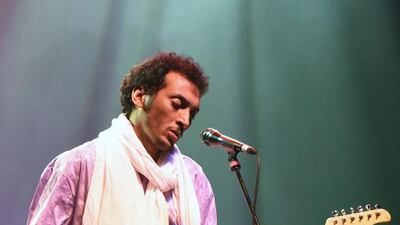It is often the quiet ones you have to look out for. “Bombino”, real name Omara Moctar, is not your typical rock star. Tall, gangly and demure, the 36-year-old is a picture of concentration and contemplation before his recent performance as part of the Mawazine Festival in Morocco.
However, once he plugs in his Stratocaster and steps on stage, dressed in the traditional Malian garb of indigo-coloured kandura and white scarf, this shy guy transforms into a manic performer.
His writhing body is spasmodic throughout the 90-minute set, as he summons a variety of startling riffs, ranging from rock and blues to reggae.
It is no wonder the Tuareg artist has become a darling of the world-music scene as well as the often-fractious indie-rock community.
His music offers the best of both worlds: it features the mysterious desert vibes that come from his dedication to Tuareg’s celebrated folk tradition, and there is also his fiery rock prowess, which channels guitar heroes such as Jimi Hendrix and Dire Straits’s Mark Knopfler.
A scan of Bombino’s gigging schedule is another indication of how comfortable he is straddling both worlds — from Womad-type music festivals in southern Europe to small and sweaty rock gigs on American’s east coast.
For Bombino, it makes no difference.
“I love to travel. It’s my way of life to go out and meet interesting people,” Bombino explains. “Even when I wasn’t playing music, I would go out and explore. So I love being on the road, it’s enjoyable to me.”
The reason for the year-long tour is his latest album, Azel. Released this year, his third album is his slickest offering yet.
Where 2013's Nomad and his 2011 debut Agadez were characterised by bone-dry production and ferocious guitar attacks, on Azel we find Bombino dialling it down a notch.
Recorded in upstate New York, and produced by David Longstreth from experimental rock group Dirty Projects, Azel is more about texture than power.
Bombino says it is a result of working with a band in total sync with each other.
“We have been touring together for a while now and we know each other very well. Our tones and arrangements are better, and everything was wrapped up in three weeks,” he says.
“I think it represents me the most. It also shows the connection between myself and the band. Also, I didn’t want it to be totally traditional — I wanted to show the connection between Tuareg music and rock. By doing that, I think we can improve the quality of Tuareg music and take it up to another level.”
Born in the Niger city of Tidene, Bombino’s life has been defined by movement. Part of the Tuareg Ifoghas Tribe, he fled to Algeria and then Libya after the bloody Tuareg rebellion in 1990.
During the seven years that followed, Bombino taught himself how to play the guitar to the sounds of Hendrix and Dire Straits.
After a spell performing as part of legendary Tuareg guitarist Haja Bebe’s band, Bombino returned to Niger, by then relatively safe, and launched into a music career.
When another Tuareg uprising broke out in 2007, Bombino again found himself in exile, spending three years in Burkina Faso. It was there that filmmaker and admirer Ron Wyman tracked Bombino down. Impressed by his raw cassette recordings, Wyman convinced the musician to record his debut album, the international hit Agadez.
Where the anxiety of displacement was a hallmark of the music of Agadez and Nomad, the new record — which like all his recordings is sung in the Tuareg language Tamasheq — finds Bombino's mood a little lighter.
Opening track Akhar Zaman's souped-up rock riffs perk up the meditative lyrics about the loss of culture: "Our ancestral language and alphabet are threatening to disappear and our dearest practices are losing their place," he sings.
In the lilting Inar, meanwhile, the mystery of the desert serves as a metaphor for unrequited love.
Bombino explains his bemusement at the suggestion by critics that the lyrics on the new album are a departure from his previous work.
“It is not always about resistance,” he says.” This may be the image that we have [but] there is more than just fighting. The Tuareg people do like to have fun. We live in the desert, and in that landscape you really can’t bother anybody because it is so vast. We keep organising parties, camel races and enjoy ourselves.”
The desire to shed such misconceptions is partly behind Bombino's decision to expand his sound in Azel. Examples include the reggae backbeat for Timidiwa and the propulsive blues rocker Jaguar. He hopes the album inspires fellow Tuareg artists to keep an open mind.
“I want to evolve this music without losing the roots and originality of it,” he says.
“The key is to keep paying attention to it to maintain its original sound, while keeping ourselves open to new music and incorporating new influences. That way we can reach out to more people.”
As for the possibility of a show, in the UAE, Bombino hopes a touring opportunity comes along.
“I definitely want to come,” he says. “I remember being on a plane to Australia and flying over your beautiful desert. It made me feel of home — and I told myself I have to come back and visit sometime.”
• Azel by Bombino is out now
Next week on Mawazine sessions, we speak to the celebrated jazz bassist Marcus Miller
sasaeed@thenational.ae


